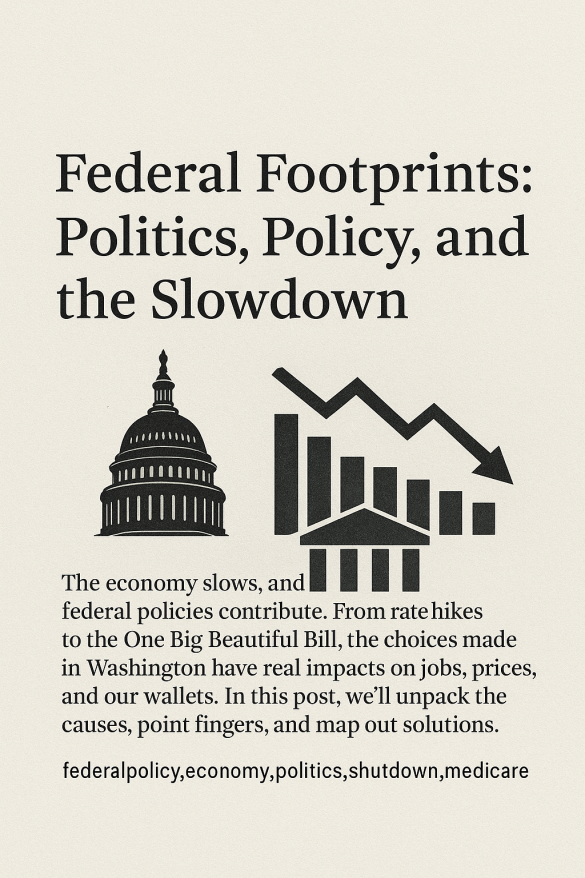The Federal Slowdown: When Politics Stalls Progress
America’s economy is slowing, and it’s not by accident. The causes run deep—rising interest rates, tariff aftershocks, a grinding government shutdown, and now the ripple effects of the One Big Beautiful Bill Act (OBBB). These overlapping forces expose how political inaction, partisanship, and policy shifts hit the same people: ordinary Americans.
This discussion continues the themes explored in Tariffs, Interest Rates, and the Housing Market and How Media Coverage Shapes the Truth, where we examined how decisions made in Washington translate into real consequences for families, buyers, and workers.
Economic Reality: The Cost of a Stalemate
The federal government shutdown—now over a month long—has left hundreds of thousands of federal workers unpaid. Air traffic controllers, TSA agents, and other essential employees are working without compensation, while millions dependent on SNAP benefits face uncertainty. The Congressional Budget Office projects losses between $7 billion and $14 billion if the impasse drags on.
Federal inaction doesn’t just halt paychecks—it ripples through the economy. Homebuyers pause, businesses freeze hiring, and consumer confidence weakens. As history shows, even after funding resumes, the recovery lags.
Health Care and the One Big Beautiful Bill Act
The One Big Beautiful Bill Act reshapes major safety-net programs. Analysts at the Center for American Progress warn that its proposed cuts could jeopardize care for millions. Nearly one in four Medicare and Medicaid recipients may lose the ability to pay hospital bills, threatening closures in rural and community hospitals nationwide.
Meanwhile, health coverage costs are rising sharply. The Kaiser Family Foundation projects Affordable Care Act premiums could double if enhanced subsidies expire. In Texas, insurers already propose average rate hikes of 24%, with some exceeding 39%, according to the Texas Tribune.
When premiums climb, household budgets shrink. When hospitals close, entire local economies suffer. Health care and economic stability are intertwined—cuts to one destabilize the other.
Student Loans, Disability Delays, and Everyday Struggles
Millions of Americans now face resumed student loan repayments. Promised relief or forgiveness measures remain tangled in legislative and judicial limbo. For those awaiting disability benefits, the shutdown has halted processing, forcing many to live without essential income.
This confluence of crises paints a grim picture: while policymakers argue over budget lines and ideology, the people they serve fall behind. As one federal worker told Reuters, “We’re told to keep showing up, even when the government doesn’t.”
The Political Divide: Who’s to Blame?
Republicans argue that unchecked spending fuels deficits and inflation, demanding fiscal restraint. Democrats counter that austerity deepens inequality, insisting that strong safety nets sustain demand. Both have valid points—and both share blame for the stalemate.
This is the polarization you wrote about in How Media Coverage Shapes the Truth. Media framing shapes perception: one outlet blames “runaway spending,” another decries “reckless obstruction.” The truth sits in triangulation—combining facts, outcomes, and human experience.
Paths Forward: Blended, Balanced, and People-First
To move forward, America needs pragmatic steps rooted in compassion and fiscal logic:
- Immediate reopening: Fund essential services. Resume SNAP, disability, and federal pay. Reassure markets.
- Protect safety nets: Extend ACA premium subsidies. Safeguard Medicaid and Medicare funding to prevent hospital closures.
- Fiscal discipline: Curb waste and modernize spending oversight without punishing people with low-income.
- Transparent communication: Use data-driven reporting to restore trust and accountability.
A balanced policy approach—some restraint, some relief—could stabilize the economy faster than partisan victory laps ever will.
Conclusion: “We the People” Deserve Better
The Constitution begins with We the People, not We the Parties. Americans—workers, parents, retirees—bear the cost of this impasse. The federal effect on the economy is not abstract. It’s measured in missed paychecks, rising premiums, and shuttered hospitals.
As we confront this slowdown, the question isn’t which side wins. It’s whether the people who built this country can afford to keep living in it.


